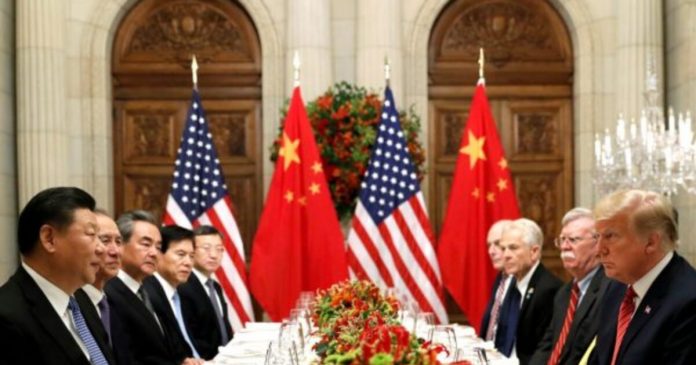
Kamala Harris is weak on China and strongly in favor of socialism.
Populist measures like student debt forgiveness, removing medical debt from credit scores, free money for home buyers, and expanded welfare benefits will lead to inflation, reduce workforce participation, and stifle technological advancement.
Prioritizing diversity over merit in defense and research sectors will undermine national strength, while open borders are enabling the unchecked entry of terrorists, transnational criminals, and foreign agents.
Trump recognizes the threat posed by China and supports imposing 60% tariffs on Chinese imports to help the U.S. decouple from Beijing.
He advocates for closed borders and a strong military, with the Department of Defense, government, and private sectors hiring the best candidates based on merit.
His tough stance on China would accelerate the decoupling from the PRC, removing Beijing from U.S. supply chains and stopping American dollars from funding the People’s Liberation Army—whose weapons are aimed at the U.S. and Taiwan.
To safeguard the nation and strengthen the economy, the U.S. needs an economic and national security strategy more aligned with Trump’s approach than Kamala’s.
Historically, U.S. policy emphasized seizing opportunities by opening global markets, fostering growth, and improving efficiency.
Today, the focus has shifted toward managing risks like pandemics, climate change, technological advances, and rising competition from China.
This shift has popularized the concept of “economic security,” which involves protecting national interests by reducing economic vulnerabilities.
Countries like Japan and the EU have already developed comprehensive strategies, while the U.S. has responded with measures such as tariffs, export controls, and industrial policies, especially targeting China.
Both Trump and Biden have prioritized critical sectors like semiconductors and electric vehicles, investing trillions to bolster economic resilience.
To counter China effectively, the U.S. needs a comprehensive economic and security policy backed by its allies.
While Japan, the EU, and some G7 members have supported U.S. tariffs and restrictions, certain NATO countries—like France, Germany, and Turkey—continue trading with China, undermining U.S. efforts and delaying the West’s decoupling from Beijing.
The G7 introduced the concept of “derisking,” which calls for a gradual reduction in dependency on China, but this slow approach is insufficient given China’s aim to be ready for conflict with the U.S. by 2027.
A more abrupt decoupling is required, and it can only be achieved through unified action by all allies.
As the clock ticks closer to a potential showdown with China, the U.S. must act swiftly and decisively, with strong support from its allies. Protecting sensitive technologies from adversaries like China and Russia should be a top priority.
This requires tightening export controls, enforcing rigorous investment screening, and collaborating closely with Western allies to prevent the transfer of critical technologies that could boost the military-industrial capabilities of these nations.
While export controls and investment screening are vital tools, a unified strategy with allies is crucial to effectively confront these threats. Securing critical supply chains, particularly in response to China’s dominance in critical minerals, is equally important.
Forming partnerships with key allies and African nations, which hold significant reserves of these minerals, will be essential for ensuring energy security and reducing reliance on adversarial nations.
Another critical aspect of the U.S. economic and national security strategy must be securing the financial system from cyberattacks and financial crimes, which pose serious threats to both national and economic stability.
Strengthening public-private partnerships is essential to protecting the financial sector, which underpins the U.S. economy and reinforces global trust in American leadership.
The EU has started developing its own strategies to reduce vulnerabilities and control critical technologies, including the creation of an Economic Security Strategy to assess threats and guide member states on these matters.
While the U.S. remains focused on balancing competition with China and strengthening its economy, it’s clear that moving forward, the U.S. will need to persuade the EU to coordinate strategies in a way that protects both parties’ economic and security interests—without alienating each other or undermining U.S. efforts to contain China.
Regardless of the 2024 U.S. presidential election outcome, the U.S. will continue imposing tariffs and restrictions on trade and investment with China. However, with a Trump victory, the decoupling process would likely accelerate.
Trump is more inclined to sideline cooperation on key issues like climate policy or artificial intelligence and is more likely to pressure the European Union, especially Germany, to comply with U.S. demands.
The post Kamala’s Economic Policies Will Weaken National Security appeared first on The Gateway Pundit.
This article may have been paraphrased or summarized for brevity. The original article may be accessed here: Read Source Article.









